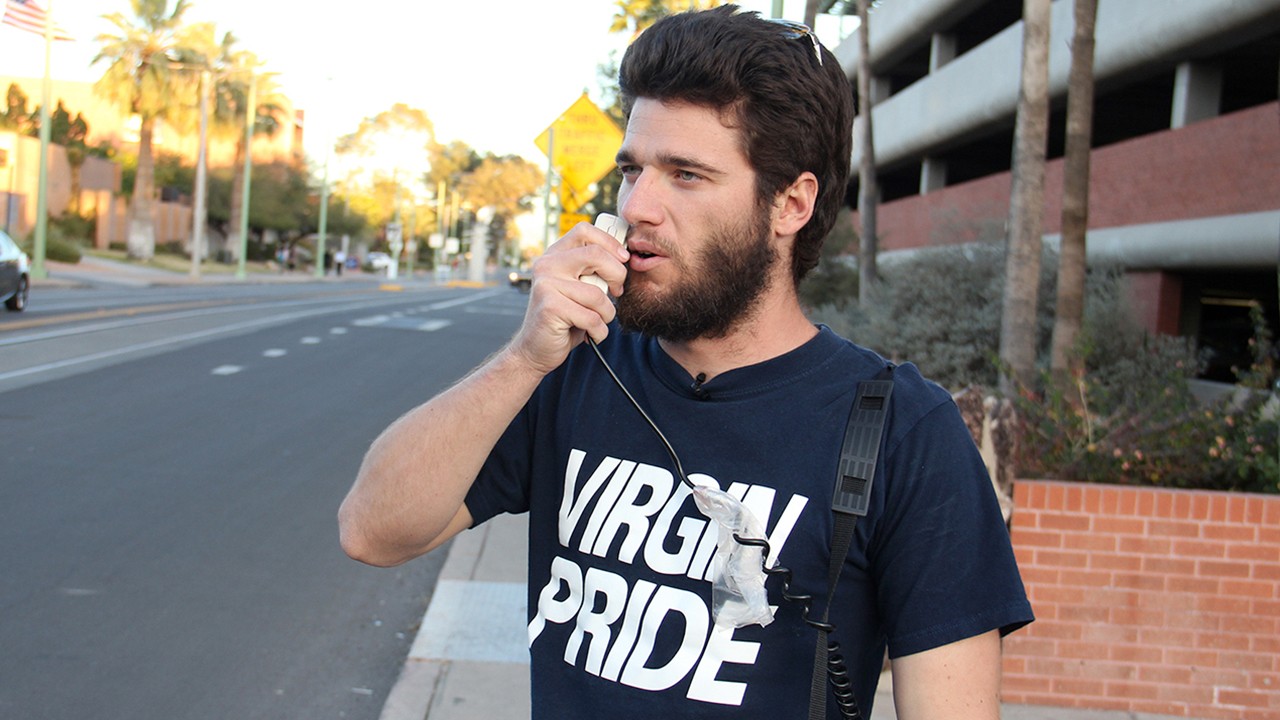(Photo by Chris Bethell)
Next week, I fly to Dublin after being invited by students there to take part in a debate about LGBT politics. The polite email from the society president who invited me assured me that my expenses would be paid and I would receive a lavish meal! How fucking fancy! Let's be honest – having a bunch of wide eyed young students tell you they want you to come and speak is quite the ego trip, like being asked to write an opinion piece for VICE or a seeing on Facebook that a bully you went to school with is getting divorced.It seems that this peculiarly middle class legal high is so addictive the withdrawal symptoms may be too hard to bear for many people in the British media. Some have had to go cold turkey when they find they're no longer on the mailing list for feminist societies or union debates. Apparently members of these private, autonomous student communities have decided to retract or simply not extend an invitation. When I'm not invited to private events I've always found the most mature thing to do is whinge about it to anyone who will listen then call for the Government to intervene and make people invite me.On Thursday, Universities Minister Jo Johnson put forward proposals for a consultation about challenging so-called safe spaces culture, clamping down on student unions that "no platform" speakers, and uphold free speech. Yes, that's right – actual government ministers are now spending time examining the great civil rights struggle of our age: the right of a bunch of C-list transphobes and racists to prattle on over a glass of Echo Falls in Lecture Theatre 2 in the Chemistry School to an audience of teenagers who, in most cases, don't want them there. Because – let's be honest – the people who are actually popular always get to speak in the end. I mean, I dislike Germaine Greer as much as the next transsexual who transitioned to murder and exorcise the ghost of their mother (admit it, Germaine, you just stole your theories about trans women from the plot of Psycho) but I recognise she can still pull a crowd. Which is why her heavily contested talk at Cardiff University in 2015 actually went ahead. That's the thing you see – for all this talk of censorship many of these "controversial figures" do actually get a lot of airtime.And why is that? Largely because of the societal advantages of those being "silenced". I regularly ask for open mic slots on the stand-up comedy circuit and pitch publications with ideas. I'm regularly turned down or get my booking cancelled. But no one cares or calls that censorship because I don't have a column in the national media to loudly complain about it. I don't understand myself to have an entitlement to be booked. Student societies and unions are autonomous, self-governing structures – many have their own constitution and elected officers with decision-making abilities. If, for whatever reason, that process results in someone being blocked by a society or union from an invitation it's for members of those societies who disagree with the decision to take it up with their representatives. In fact – a majority of students agree with this approach even if they won't agree with every individual result it produces. So it all seems pretty democratic to me. The mainstream media and now government officials getting involved seems petty at best, sinister at worst.In most collaborative enterprises there are restrictions on free speech based on shared values – I've yet, for example, to work anywhere that lets you watch hardcore fisting porn on your work PC. Maybe that is censorship but it's actually something I sign up for when I agree to join the organisation. Similarly, if you sign up for an organisation whose values include promoting welfare of trans students or BAME students it may well be that its leadership can drop any speaker who may compromise that overriding principle. The right to free speech isn't the right to witter on everywhere on every platform. Having a platform is always a negotiated privilege.

There's an unpleasant dishonesty about all this too. While we pompously pretend "free speech" is something being denied to a handful of narcissists who live for the applause of a panel because they aren't talented enough to grace a West End stage (I include myself in this) we ignore the growing preponderance of state intrusion in student life. The government's controversial "Prevent" anti-extremism strategy, for example, which has imposed a duty on staff at universities to – in effect – racially profile Muslim students for signs of extremism and the ongoing contestation about police presence (both uniformed and undercover) amid student organising in recent years. It's worth remembering that Jo Johnson is the same universities minister who is proposing fining universities for blocking controversial speakers has defended Prevent.We often refuse to acknowledge the inequity about who and what is focussed upon when we leverage the supposedly universal principle of free speech. The much-maligned campus "safe space" is roundly mocked and vilified but, as the artist and writer Hannah Black deftly argues: "critics seem not to have noticed… how their own safety is premised on the radical lack of safety of others. They are more troubled by the thought police, who don't exist, than by the real police, who kill."There's a serious discussion to be had about who controls the parameters of this discussion, but for now I choose to remain faintly amused by much of it and the gallery of media attention seekers at its core. I look forward to my debate in Dublin next week because I, too, like attention. But should they choose to disinvite me between now and then because something I said is found objectionable, I'll try and resist the urge to call up the Irish government to defend me. It's called being a grown up.@shonfaye
Advertisement
Advertisement
Advertisement

There's an unpleasant dishonesty about all this too. While we pompously pretend "free speech" is something being denied to a handful of narcissists who live for the applause of a panel because they aren't talented enough to grace a West End stage (I include myself in this) we ignore the growing preponderance of state intrusion in student life. The government's controversial "Prevent" anti-extremism strategy, for example, which has imposed a duty on staff at universities to – in effect – racially profile Muslim students for signs of extremism and the ongoing contestation about police presence (both uniformed and undercover) amid student organising in recent years. It's worth remembering that Jo Johnson is the same universities minister who is proposing fining universities for blocking controversial speakers has defended Prevent.We often refuse to acknowledge the inequity about who and what is focussed upon when we leverage the supposedly universal principle of free speech. The much-maligned campus "safe space" is roundly mocked and vilified but, as the artist and writer Hannah Black deftly argues: "critics seem not to have noticed… how their own safety is premised on the radical lack of safety of others. They are more troubled by the thought police, who don't exist, than by the real police, who kill."There's a serious discussion to be had about who controls the parameters of this discussion, but for now I choose to remain faintly amused by much of it and the gallery of media attention seekers at its core. I look forward to my debate in Dublin next week because I, too, like attention. But should they choose to disinvite me between now and then because something I said is found objectionable, I'll try and resist the urge to call up the Irish government to defend me. It's called being a grown up.@shonfaye
